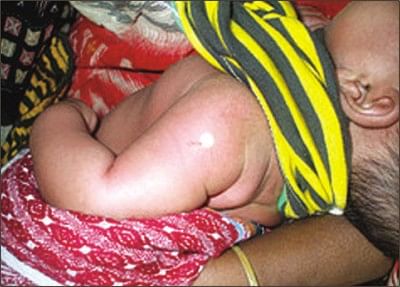Save newborns at risk of hepatitis B virus

Every year, a significant number of children is born with Hepatitis B virus (HBV) and a considerable number is exposed latter in their lifetime. However, vaccine to prevent the virus introduced in the national immunisation programme in Bangladesh is inaccurately scheduled that does not comply with scientific recommendation.
For seven years, it has been running with an improper schedule that fails to give effective protection and puts high risk newborns at greater risk. Hepatitis B vaccine was introduced in the Expanded Programme on Immunisation (EPI) schedule in 2003 with a view to preventing transmission of HBV from hepatitis B positive mothers to newborn babies and to provide a lifelong protection from subsequent infections.
In the national programme, the schedule of immunising babies with 3 doses of hepatitis B vaccine is at 6, 10 and 14 weeks after birth along with DPT. However, the World Health Organisation (WHO) Strategic Advisory Group of Experts (SAGE) recommended that all infant should receive first dose of hepatitis B vaccine within first 24 hours of delivery. Whereas, national schedule in Bangladesh suggests immunising babies at 6 weeks of life with the first dose of vaccine. But the virus do not wait to be transmitted until six weeks and can easily be transmitted from hepatitis B positive mothers to their babies during delivery process. As a result, it leaves many at risk babies unprotected in their neonatal period when they need it the most.
According to a paper by Harunor Rashid, Rafiq SM published in international journal named Hepatitis Monthly, it has been found that about 1.2 to 3.5 percent of the pregnant ladies in Bangladesh are HbsAg positive who can potentially transmit the virus. So, delay in vaccination for the first six weeks will put 70-90 percent babies at risk of acquiring infection immediately after birth.
As the current schedule suggests waiting unit six weeks, it is unlikely for the parents to vaccinate their babies in time after birth even if they are at high risk. This phenomenon increases the risk rather than protection.
Experts recommend making the vaccine effective by giving it immediately after birth along with BCG vaccine. The 2nd dose can be scheduled on 6th weeks after birth with other vaccines at the same setting.
Professor Mohammad Ali, Secretary General of Liver Foundation and member of the World Hepatitis Alliance Public Health Panel pointed out that the routine immunisation schedule for HBV should be changed to the standard form on an urgent basis in order to protect huge number of at risk babies from contracting HBV. He underscored on antenatal screening combined with effective neonatal vaccine and immunoglobulin that can effectively reduce the transmission and at a lower cost.
He also opined, "Children who are being infected with the virus since birth and become a chronic carrier, have much greater risk of developing fatal complications like liver cirrhosis, liver cancer. Again, blocking the virus at an early age will subsequently reduce the necessity of mass screening in near future."
Since the introduction of the vaccine in EPI, the issue of changing the schedule is grossly overlooked and health policy makers are reluctant to review and reschedule. Dr Mahmudur Rahman, Director of Institute of Epidemiology, Disease Control and Research (IEDCR) said that most of the newborn babies have been brought to get vaccinated at six weeks along with the first dose of DPT. As there is low coverage of vaccine immediately after birth, the first dose of hepatitis vaccine is scheduled at six weeks to get wider coverage. However, he expressed that it needs to be modified and they, as an authority concerned are reviewing to change the strategy.
Immunising newborns at risk within the first 24 hours of birth is scientifically the best approach to protect them. National immunisation schedule regarding the first dose of the vaccine needs to be provided on the first day of life. Otherwise, a number of at risk newborn babies might get the virus before they get the vaccine.
E-mail: [email protected]

 For all latest news, follow The Daily Star's Google News channel.
For all latest news, follow The Daily Star's Google News channel. 



Comments